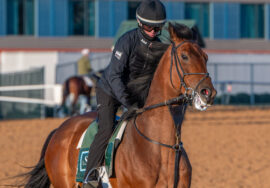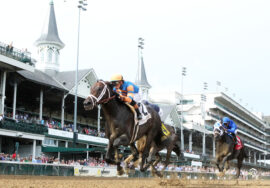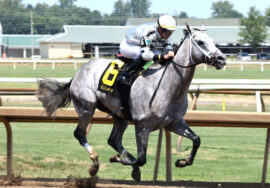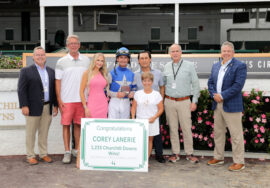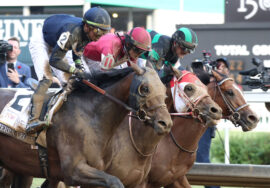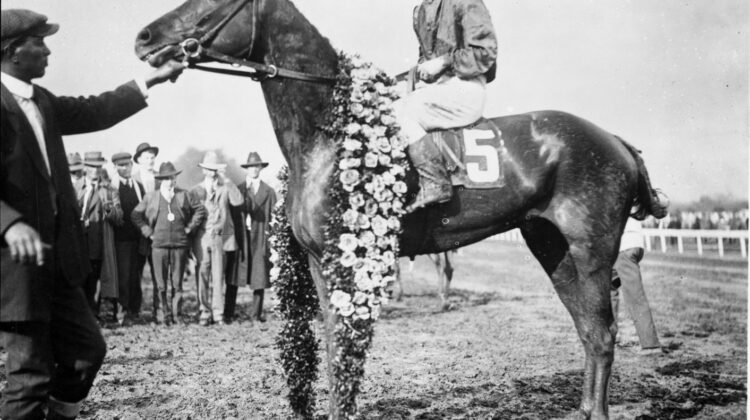
100 years ago, Exterminator won memorable Clark Handicap
(Wonderful story by Kevin Kerstein, Churchill Downs publicity. CD photo)
LOUISVILLE, Ky. (Friday, Nov. 18, 2022) – It’s been 100 years since Willis Kilmer’s famed Exterminator rallied to a 1 ½-length victory in the 1922 Clark Handicap at Churchill Downs. At the time, his win would go down as one of the most memorable Clark victories in history.
Exterminator, the winner of the 1918 Kentucky Derby, was dubbed as the “greatest gelding in American racing,” according to an excerpt in the Lexington Herald Leader on April 9, 1922. Prior to starting his 7-year-old campaign, Exterminator was the fifth leading money winner in American racing, trailing only Man o’ War, Damino, Sysonsby and Colin.
Kilmer planned to run Exterminator in both the $10,000 Kentucky Handicap and $10,000 Clark Handicap in May at Churchill Downs and the $15,000 Independence and $10,000 Daniel Boone Handicap in June and July, respectively, at Latonia Race Track.
In the Clark, former track superintendent Tom Young was forced to work the track overnight after wet weather struck the area. The track was listed as “fast” for the Clark, which was run at 1 1/8 miles. In the 20 years prior, the Clark was run at 1 1/16 miles.
A field of 13 horses entered in the Clark with Exterminator drawing post No. 6 with Albert Johnson in the irons and was listed as the 133-pound high weight. The next highest allotted weight was Firebrand, who carried 120 pounds. The lowest was No. 1 Blarney Stone, who carried 97 pounds.
Three-year-old filly Lady Midcap set the early fractions in the Clark and nearly carried her speed to a wire-to-wire victory. Exterminator was able to rally three wide and catch Lady Midcap inside the sixteenth pole to win the Clark. Exterminator stopped the clock in 1:50, missing the track record by just a fifth of a second that was set Oct. 21, 1921 by Dr. Clark.
In a 1922 excerpt from Louisville’s Courier-Journal by C.J. Savage, Exterminator’s Clark was described as a “wonderful race that will linger forever in the memories of those who witnessed it.”
Exterminator used the 1922 Clark to vault to Horse of the Year honors in his 7-year-old campaign. The Clark victory was Exterminator’s 20th win from 35 starts. His backers were awarded pari-mutuel payouts of $3.20, $2.80 and $2.30.
Exterminator is known to many racing fans as “Old Bones” from his bony appearance. He shocked fans when won the 1918 Kentucky Derby at odds of 30-1.
During his career, Exterminator was in the care of eight different trainers and retired with 50 victories from 100 starts. Exterminator tabbed lifetime earnings of $252,996. He was inducted into the U.S. Racing Hall of Fame in 1957 and the Canadian Racing Hall of Fame in 2016.
Things have changed slightly in the past 99 runnings of the Clark. The race is now worth $750,000 and was moved to the Fall Meet in 1953. The Clark earned Grade I status in 2010 and in 2019 was made a regular stakes event rather than a handicap.
Kentucky Derby 148 hero Rich Strike will attempt to join Exterminator and become one of 15 horses to win both the Derby and Clark when the 148th running of the race is staged Friday, Nov. 25. The Derby winners to complete the double are Silver Charm (1998), Whirlaway (1942), Exterminator (1922), Old Rosebud (1917), His Eminence (1901), Lieut. Gibson (1900), Plaudit(1898), Halma (1895), Chant (1894), Azra (1892), Riley (1890), Spokane (1889), Buchanan(1884) and Hindoo (1881).




